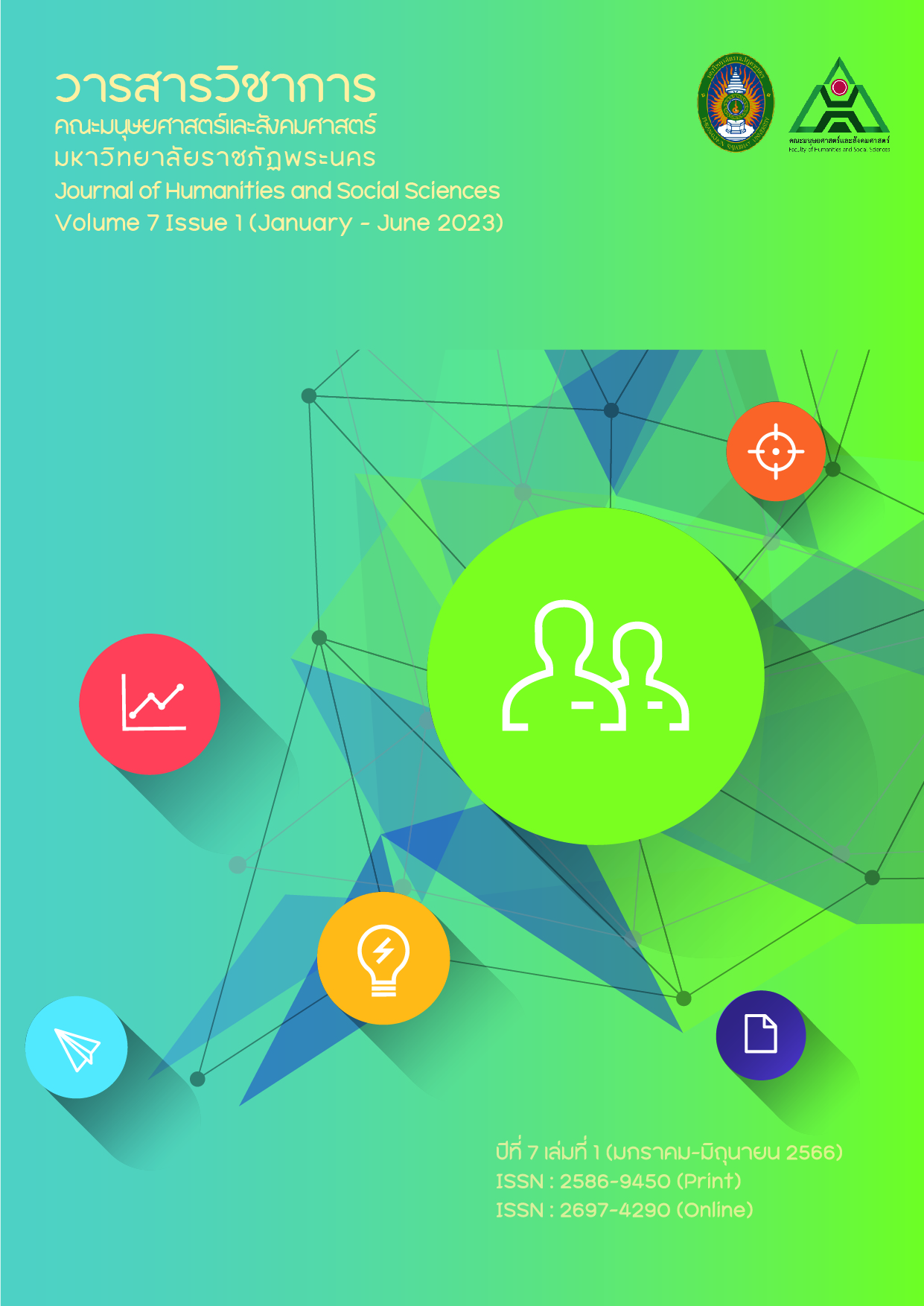การเรียนการสอนออนไลน์พัฒนาสู่การเรียนการสอนแบบผสมผสาน ของนักศึกษาระดับปริญญาตรีภายใต้ผลการเรียนรู้ตามกรอบมาตรฐานคุณวุฒิอุดมศึกษาแห่งชาติในสถานการณ์โรคระบาดโควิด 19
Main Article Content
Abstract
In the current situation, rapid technological changes and the spread of COVID-19 that has continued, teachers must focus on teaching online. (e-learning), which has 6 key elements, teachers must focus on teaching online (e-learning), which has six key components consist of 1) content and teaching materials, 2) information delivery and communication system,
3) communication and learning interaction system, 4) measurement and evaluation system, 5) learning support system; and 6) teachers and learners. In which teachers must manage online teaching and learning in order to meet the learning outcomes according to the National Qualifications Framework for Higher Education for Bachelor's Degree in all 5 areas with efficiency and effectiveness, consisting of 1) moral and ethics 2) knowledge 3) intellectual skills 4) interpersonal skills and responsibilities and 5) numerical analysis skills communication and the use of information technology. However, teaching in the classroom is still important to learners. Therefore, educational organizations must focus on blended teaching and learning. In which teachers must apply elements of online teaching. (e-learning) in all 6 elements to be effective and effective for the learners as much as possible by strictly focusing on learning outcomes under the framework of the National Higher Education Qualifications Standards. In terms of learning outcomes on moral and ethics and on interpersonal skills and responsibility, teachers should focus on teaching methods. The result of learning knowledge intellectual skills and numerical, communication and information technology skills should be placed on skills, knowledge and ability to teach.
Article Details
References
Allen. I. E. & Seaman. J. (2010). Learning on demand: Online education in the United States, 2009. Sloan Consortium. PO Box 1238, Newburyport, MA 01950.
Boonyachai, Y. (2020). Behavior and online teaching elements (e-learning) influencing the learning outcome of Thai qualification framework for higher education in digital era: A case study private university among benjamitra network in Bangkok and outskirt. Research Report Rajapruk University.
Cook, D. A., & Steinert, Y. (2013). Online learning for faculty development: A review of the literature. Medical Teacher, 35(11), 930–937.
Cheevakasemsook, A. (2021). Nursing teaching and learning management with blended learning in new normal era. Journal of Health and Nursing Research, 25(1), 25-37.
Colman, C, Tiru, L, Schmitz, L, Stanciu, C & Bularca, M. (2020). Online teaching and learning in higher education during the coronavirus pandemic: students’ perspective. Sustainability MDPI, Open Access Journal, 12(24), 1-4 https://doi:10.3390/su122410367.
El-Seoud, M, Taj-Eddin, I, Seddiek, N, El-Khouly, M & Nosseir, A. (2014). E-learning and students’s motivation: A research study on the effect of e-learning on higher education, International Journal of Emergency Technologies in Learning, 9(4), 20-26.
Eze, S, Chinedu-Eze, V, Okike, C & Bello, A. (2020). Factors influencing the use of e-learning facilities by students in a private higher education institution (HEI) in developing economy, 1-15, http://doi.org/10.1057/s41599-020-00624-6.
Gopal, R, Singh, V & Aggarwal, A. (2021). Impact of online classes on the satisfaction and performance of students during the pandemic period of COVID19, Education and Information Technologies, 1-25. http://doi.org/10.1007/s10639-02110523-1
Horn. B.M. & Staker. H. (2011) The Rise of K-12 Blended Learning. Unpublished Paper. : Innosight Institute.
Lalima & Dangwal, KL. (2017). Blended learning: An innovative approach universal. Journal of Educational Research, 5(1), 129 - 136. DOI: 10.13189/ujer.2017.050116.
Office of the Higher Education Commission. (2009). Thai Qualification framework for higher education. Retrieved from http://www.mua.go.th/users/tqf-hed/
Panda, D, Gamal, M, Zafar, A, Parambi, D, Senapati, A, Patro, S, Sahoo, P & Bose, A. (2020). A study on the effectiveness of online teaching in pharmacy education from teacher and student perspective during the covid-19 pandemic. Phamacy Education, 20(2), 297-301. http://doi.org/10.46542/pe.2020.202.297301
Panto, P. (2020). Teaching and learning management in Thailand under the epidemic situation of infectious diseases coronavirus 2019 (COVID-19). Retrieved from https://library.parliament.go.th/sites/default/files/assets/files/works/academic%20office/radio%20scripts/pdf/2563-06/NALT-radioscript-rr2563-jun5.pdf
Phakharattanavanich, P, Laddaklom, S, Jittreebut, T. (2022). Developing a model for teaching and learning international music practice in the situation of the corona virus epidemic. Journal of Humanities and Social Sciences, 6(1), 191-207.
Pham, L, Limbu, Y, Bui, T Nguyen, H & Pham, H. (2019). Does e-learning service quality influence e-learning student satisfaction and loyalty? Evidence from Vietnam. International Journal of Education Technology in Higher Education, 16(7), 1-26
Photong, P, Chansuvarn, S, Khachat, S & Sripho, S. (2016). Development of a problem-based instructional models to promote critical thinking of nursing sciences students and the students’ learning outcomes according to the Thai qualification framework for higher education. Nakorn Phanom University Journal, 6(3), 124-132.
Saadé, R. G., He, X., & Kira, D. (2007). Exploring dimensions to online learning. Computers in Human Behavior, 23(4), 1721–1739. https://doi.org/10.1016/j.chb.2005.10.002
Sikkhaman, K. (2011). A study of achievement in learning subject: business English communication teaching by e-learning. Research reports for teaching and learning development, Sripatum University.
Siritarungsri, B. (2020). The Management of online learning and teaching: towards the professional standards framework for teaching and supporting learning in higher education. Chulabhorn Royal Acad, 2(3), 1-17.
The Training Place. (2004). Blended learning definition/adaptive learning intelligence model. Retrieved from http://www.trainingplace.com/about /alimodel.htm.
Thorne, K. (2003). Blended learning: how to integrate online and traditional learning. London: Kogan Page.
TQF is. (2018). Retrieved from http://www.elfit.ssru.ac.th/prawit_so/pluginfile.php/61/
Tammetha, T. (2014). E-learning from theory to practice. Thai cyber university project. Bangkok: Office of the Higher Education Commission, OHEC.
Wayo, W, Charoennukul, A, Kankaynat, C & Konyai, J. (2020). Online learning under the COVID-19 epidemic: concepts and applications of teaching and learning management. Regional Health Promotion Center 9 Journal, 14(34), 285-297.


